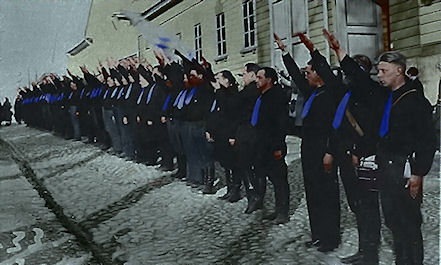Oheisesta jutusta saa käsityksen, että Stubb vastustaa rähmälläänoloa ollessaan ulkomailla, muttei Suomessa?
Putin Intimidation Tactics Kill Entente Hope for Finnish Premier
By Kati Pohjanpalo Oct 15, 2014 1:00 AM GMT+0300
0 Comments Email
Print
Save

Photographer: Henrik Kettunen/Bloomberg
Finnish Prime Minister Alexander Stubb said President Vladimir Putin’s policy of...
Read More
Finnish Prime MinisterAlexander Stubb said President
Vladimir Putin’s policy of intimidation shows any goal of forging more harmonious ties between
Europe and Russia must now be shelved.
Stubb, who already in 2008 said a five-day war with
Georgia betrayed the Kremlin’s preference for military aggression in its foreign policy, says the Russian government has unsettled its former Cold War foes with its erratic behavior.
“We should now for a while forget the idea that Russia will become a regular western state: it will not,” Stubb said in an interview in Helsinki on Oct. 13. “Its behavior is currently very unpredictable.”
Putin, of whom former U.S. President
George W. Bush in 2001 said he had a “
sense of his soul” and anticipated “a very constructive relationship,” has become a diplomatic pariah after annexing Crimea.
Finland’s relations with Russia, with which it shares the European Union’s longest border, have soured as trade ties deteriorate and following repeated airspace violations.
The Nordic country, which has stayed outside NATO, in 2008 under then Prime Minister Matti Vanhanen supported closer ties between Brussels and Moscow. Stubb, then a 40-year-old foreign minister, took a different line and, even after Russian fighting in the Caucasus ended, was cautioning Europe against a naive view of Putin’s goals.
Now, Stubb says Putin’s acts risk destabilizing the whole region around Ukraine.
Border Tensions
“Right now Russia is behaving, clearly, in a fashion which is uncomfortable,” said Stubb, now 46. “There is a sense of foreign-policy intimidation, there is a sense of destabilizing borders and neighbors, on different scales.”
The northernmost euro member fought two wars against the
Soviet Union during World War II, ceding about 10 percent of its land mass in the process. Opinion polls show most Finns, unlike their Baltic neighbors, don’t want to join the North Atlantic Treaty Organization for fear of angering Russia.
According to Mika Aaltola, program director at the Finnish Institute of International Affairs, Finland’s assessment of the political threat Russia poses has been more accurate than that of some other European governments. That’s why the country has maintained a sizeable army, he said.
“Finland still has many traditional military capabilities left. This gives Finland room to maneuver,” Aaltola said in an interview.
Fighter Jets
Less than two months ago, three incursions by Russian planes into Finnish airspace caused the government in Helsinki to put its F/A-18 Hornet fighter jets on alert ready to intercept foreign aircraft. Finland has published all airspace violations since 2005, after
Russia breached the border 11 times without owning up. The diplomatic freeze between the two countries is worse than ever, Aaltola said.
“Russia’s use of its geopolitical weaponry pushes Finland away,” as do “western reactions, including the sanctions policy,” he said. “This will continue.”
Finland’s army, navy and air force are conscription-based and train about 25,000 soldiers annually. The maximum wartime capacity is being pared down to 230,000 troops from 350,000. Its air defenses are at risk of becoming outdated. The country is examining how best to replace its aging fleet of 62 Hornets acquired in the 1990s before 2030.
NATO Ties
Finland is a member of NATO’s Partnership for Peace program since 1994 and it’s looking for a way to pool resources with
Sweden, with findings due this month.
“Finland’s own resources are no longer enough to satisfy the future security needs,” Aaltola said. “Those abilities need to be found in networks, such as NATO, or other networks that can be created with Sweden or
Denmark or even
Norway. The direction is toward the west, toward NATO countries.”
Stubb said his government assumes Europe would come to Finland’s aid if needed.
“If you’re
France and you’re attacked, the reliance would probably be on NATO,” Stubb said. “If you’re Finland and you’re attacked, you’d have to hope that you get enough help from the European Union. We stress both political and economic solidarity.”
To contact the reporter on this story: Kati Pohjanpalo in Helsinki at
[email protected]
To contact the editors responsible for this story: Tasneem Hanfi Brogger at
[email protected] Jonas Bergman








